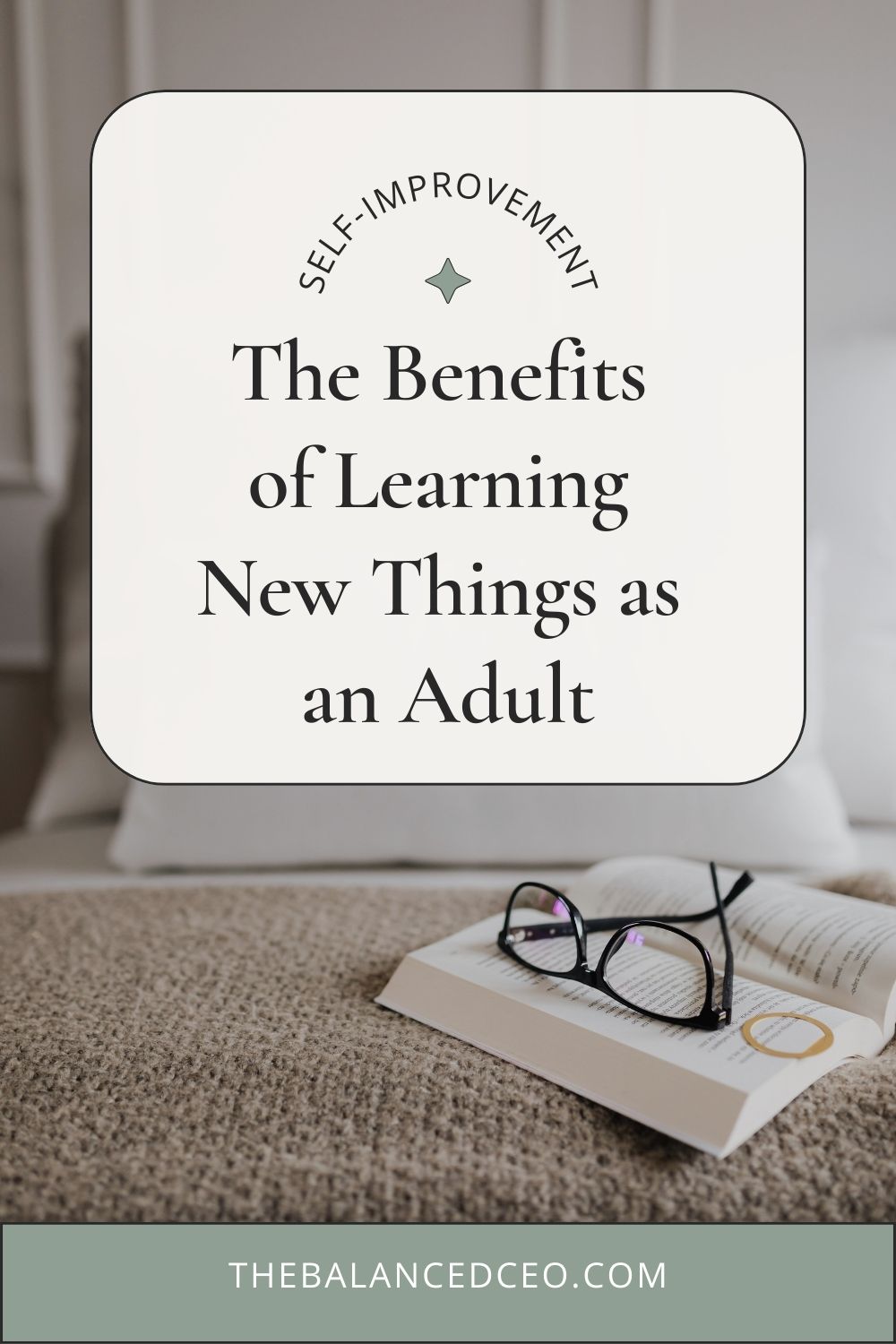This post may contain affiliate links, which means I’ll receive a commission if you purchase through my links, at no extra cost to you. Please read full disclosure for more information.

Society often associates learning as an activity for children. As a result, many adults only stick to what they picked up in their teens and 20s. However, you can always learn new things now and reap the rewards.
Whether playing an instrument, engaging in a new sport or pursuing further education, the possibilities are endless. Plus, learning new things as an adult has a few worthwhile benefits. Here’s what you can expect when you push your boundaries and expand your knowledge.
1. Mental Stimulation
Learning a new skill provides a lot of mental stimulation. Kids usually have sharp cognitive skills because they regularly undergo challenges, like moving up through different grades at school and participating in extracurricular activities.
You must also seek challenges to maintain cognitive skills as you age. Luckily, you have the freedom to choose what you will learn. You can try a language course, take cooking classes, or even explore creative hobbies such as using an xtool laser engraver to design personalized items.
University of California’s associate professor of psychology Rachel Wu, Ph.D., shares a study in which people 58 to 86 years old took skill courses for three months. The findings point to heightened cognitive abilities after that quarter.
“What was really astounding was after one year … they ended up increasing their cognitive abilities, continuing to increase their cognitive abilities all the way up to levels that were similar to undergraduates,” Dr. Wu said. “So like 20-year-olds, 50 years younger, who took the test for the first time.”
2. Physical Health
Learning is more than just a brain exercise, as it also improves physical health. Say you try to learn how to bike as an adult. Picking up that skill means you go outside more often. Longer cycling practice sessions and trips also entail better endurance.
Another example is adopting a new workout routine. Becoming fit expands your physical capabilities. You can also prepare meals to maintain your physique and ensure nutrition.
3. Emotional Resilience
Exploring new skills is a test of patience and emotions. Many people have a fear of failure that keeps them from trying new activities. However, anxiety is natural when you’re going out of your comfort zone. It doesn’t mean you should stop pursuing those interests.
Persevering through challenges can help you form emotional resilience and become more attuned to your feelings. Be optimistic as you celebrate the wins throughout your learning journey. Allow yourself to take criticism and strive to improve through it.
4. Stress Reduction
Learning distracts you from stressful situations. Think of your future sessions as a break from work and other life matters. You can take up calming activities, like gardening or knitting. You’ll end up with beautiful flowers or a new sweater to show off to loved ones.
Starting out can be a little uncomfortable, especially if you don’t immediately grasp what you’re learning. However, it’s a good form of stress that brings excitement to your life. Remember to regulate your exposure to new activities to avoid bad stress.
5. Career Opportunities
Another perk of acquiring new skills as an adult is how they can lead to new job opportunities. Say your main job focuses on administration work. There are countless courses and resources about web design and social media marketing. Combining that knowledge with your current skill set can create an impressive portfolio for a new job.
You can also consider returning to school. About 70% of jobs will need a postsecondary degree by 2027. Take the time to invest in yourself and your career. You can also shoot for a second degree if you already have one to explore a forgotten interest or gain experience in a lucrative field.
6. Potential Savings
You can generate savings with your newfound skills. For example, interior house painting can cost about $4,750, depending on the size and complexity of the project. If you take the DIY route, you only need to fund the supplies.
There are also more things to learn, such as how to repair certain appliances or maintain your car. Plus, having that extra knowledge ensures you won’t get scammed when you finally turn to those professional services.
7. Motivation
Do you ever find it hard to get out of bed in the morning? Igniting your passion for learning can motivate you to start your day. Whether you’re figuring out how to edit a video or make a new cocktail, there’s joy in solving new challenges and getting out of the lull of boredom.
Learning can even give you a new purpose. Maybe you’ll discover a skill or interest that will fuel your drive. Passion keeps life exciting and worth living, so search for it.
8. New Friends
Socializing can be daunting, but finding new friends you can lean on is beneficial. About 51% of Americans have pals they participate in sports and hobbies with. You can seek yours at local clubs or online forums.
Make plans to attend different social activities together and bond with your companions. If you want to learn about science and technology, look for fairs you and your friends can attend. People who want to explore writing can participate in creative workshops.
Invite them to intimate gatherings like holiday parties and special dinners, too. Learning is an excellent foundation for friendships, but you can use it to build emotional connections and closer relationships.
9. Sense of Achievement
Learning new skills as an adult is a process. Some moments humble you and make you more flexible, while others boost your confidence. Think of improvement milestones you’ve reached and how far you’ve come in your journey.
Mastering what you’ve learned as an adult can also give you a sense of accomplishment like no other. As a bonus, you can use that self-confidence to pick up a new skill and enjoy the benefits of learning once more.
New Things to Try
If you’re looking for inspiration, here are a few ideas for new things you can learn as an adult:
- Cooking or baking
- Painting
- Photography
- Creative writing
- Yoga
- Meditation
- Pottery
- Pickleball or tennis
- Pilates
- Roller skating
- Knitting or crocheting
- Coding or web design
- Volleyball
- A new language
- Art history
- Blogging
- Musical instruments
- Jewelry making
- Sewing
To get started, think about what level you want to learn these skills. For a casual hobby, check out free tutorials on blogs or YouTube, or find books on the subject. Research local colleges or community organizations that offer courses in art or languages. You can also see if your city has recreational sports teams that accept beginners if you want an active hobby.
For career-related pursuits, like web design or blogging, try to find programs or webinars that will provide you with a certificate you can add to your resume.
It’s Never Too Late to Learn
Discovering new things as an adult is a breath of fresh air. It reminds you just how challenging yet exciting life can really be. Push your hesitation aside and enjoy the benefits that learning provides. You never know what direction your life will take when you try new things.

Cora Gold
Contributor





Leave a Reply